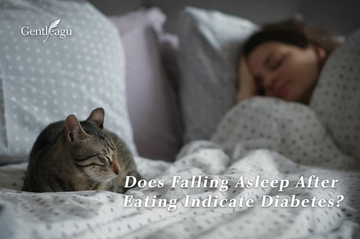Does Falling Asleep After Eating Indicate Diabetes?
Falling asleep after eating is a common experience, and while it can be related to normal digestive processes, it may also signal potential health concerns, including diabetes. Let's explore why this happens and whether it should be a cause for concern.
1. The Digestive Process and Sleepiness
After eating, your body shifts focus toward digestion, diverting blood flow to your stomach and intestines. This process can naturally make you feel more tired or sluggish. The release of certain hormones during digestion, such as insulin, can also contribute to feelings of sleepiness.
However, while it’s normal to feel a bit more relaxed or even sleepy after a large meal, especially one that’s rich in carbohydrates or fats, frequent or extreme fatigue after eating may be worth investigating further.
2. Falling Asleep After Eating: A Possible Sign of Blood Sugar Imbalance
Falling asleep shortly after eating, especially if it occurs consistently after meals, could be linked to blood sugar fluctuations. Here's how:
Blood Sugar Spikes and Crashes
-
High-Carb Meals: Eating large amounts of carbohydrates (e.g., pasta, bread, sugary foods) can cause a sharp rise in blood sugar, followed by a sudden drop, especially if your body struggles to regulate insulin. This rapid fluctuation in blood sugar levels can result in fatigue and drowsiness.
-
Insulin Response: After eating, the body releases insulin to help cells absorb glucose from the bloodstream. In people with diabetes or prediabetes, insulin may not work effectively, or the pancreas may not produce enough insulin. This can lead to imbalances in blood sugar levels, which may make you feel fatigued or drowsy.
Postprandial Hypoglycemia (Reactive Hypoglycemia)
- This condition occurs when blood sugar drops too low after eating, often due to an excessive release of insulin. It can happen in some people, particularly those with insulin resistance (a hallmark of type 2 diabetes) or in those with unregulated blood sugar levels. Symptoms include extreme tiredness, dizziness, or a strong urge to nap after eating.
Other Symptoms to Watch For:
- Increased Thirst and Hunger: Constantly feeling thirsty or hungry, even after eating, can signal that your body is struggling to regulate blood sugar.
- Frequent Urination: If you find yourself needing to urinate more often, especially at night, this can be another sign of elevated blood sugar levels.
- Blurred Vision: Diabetes can cause fluid to shift in the body, affecting the lenses in your eyes and leading to blurry vision.
- Unexplained Weight Loss: If you’re losing weight despite eating normally, it could suggest issues with blood sugar metabolism.
3. Could It Be a Sign of Diabetes?
While falling asleep after eating doesn't automatically indicate diabetes, it could be a red flag, especially when accompanied by other symptoms like those mentioned above. Persistent fatigue, difficulty staying awake after meals, or drowsiness that seems out of proportion to the amount or type of food eaten can be indicative of an issue with blood sugar regulation, which is central to diabetes.
Pre-Diabetes and Type 2 Diabetes
In the case of pre-diabetes or type 2 diabetes, your body’s insulin response is impaired. This means your body has difficulty processing glucose effectively, leading to high blood sugar levels and causing symptoms like fatigue, especially after meals.
Type 1 Diabetes
In type 1 diabetes, where the pancreas produces little to no insulin, falling asleep after eating might occur as part of the body's struggle to process glucose. However, individuals with type 1 diabetes are also likely to experience other significant symptoms, such as excessive thirst, frequent urination, and unexplained weight loss.
4. Other Possible Causes
Falling asleep after eating doesn’t always point to diabetes. It could be caused by a variety of other factors, such as:
- Overeating: Consuming large meals, especially those rich in fats or carbs, can lead to a feeling of fullness and sluggishness, which may prompt sleepiness.
- Meal Timing: Eating heavy meals late in the day or just before bedtime can naturally lead to feelings of drowsiness, as your body prioritizes digestion.
- Sleep Disorders: Conditions like sleep apnea or narcolepsy can cause daytime sleepiness, which might be mistaken for post-meal fatigue.
- Nutrient Deficiency: Low levels of certain vitamins or minerals (such as iron, vitamin D, or magnesium) can cause fatigue after eating.
5. When to Seek Medical Advice
If you frequently feel the need to fall asleep after eating, or if this sensation is accompanied by other symptoms like increased thirst, frequent urination, blurred vision, or unexplained weight changes, it’s important to consult a healthcare professional. These may be early warning signs of diabetes or another underlying condition.
A healthcare provider may recommend:
- Blood tests: To check your blood sugar levels, including a fasting blood glucose test, A1C test, or oral glucose tolerance test.
- Other diagnostic tests: These might include thyroid function tests or evaluations for sleep disorders.
Conclusion
While occasional sleepiness after a meal is usually normal, frequent or excessive drowsiness, especially if it’s accompanied by other symptoms like excessive thirst, hunger, or urination, may indicate a blood sugar issue such as diabetes. Monitoring your symptoms and seeking medical advice is crucial for early diagnosis and treatment. If you suspect you might have diabetes or another underlying condition, your doctor can help guide you through the necessary tests and recommend a treatment plan to improve your overall health.
